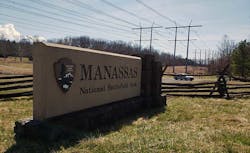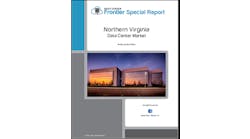Virginia State Legislators Target Data Center Development With New Bills
State legislators in Virginia have introduced bills seeking to tighten regulations around data center development, expressing concern about the potential impact of developments in Prince William County. One of the bills would ban data centers within one mile of a national park, state park or "other historically significant site."
State Senator Chap Peterson and Delegate Danica Roem proposed bills to regulate the location, water impact, and electrical connections for data center development. The bills were a response to the recent progress for the proposed Prince William Digital Gateway, which could create more than 20 million square feet of data center bring nearly $25 billion in new investment and $400 million in annual tax revenue into Prince William County.
The Digital Gateway is controversial because it is adjacent to one of the Manassas Civil War battlefields and a state forest. The proposal has faced opposition from a constellation of groups citing concerns about its impact on the community, the environment and local historic sites.
“It’s time to tap the brakes and look around and see what we’re doing,” Peterson said in a press conference Monday.
The Virginia proposals arrive just a week after the city of Chandler, Arizona adopted new zoning rules for data center operations. In October, Loudoun County in Northern Virginia passed measures to manage data center growth.
In our recent 2023 forecast, we noted the growing political challenges for data center developers, and the potential that the headlines from the heated battle in Prince William could create larger headaches for the fast-growing industry.
The new bills clearly target the Prince William Digital Gateway, but could create new considerations for development across Virginia, which is home to the world's largest cloud computing cluster. The state has 41 state parks and 22 national parks.
What's in the New Bills
Peterson is a Democrat representing the 34th District in Fairfax County, His Senate Bill 1078 says data centers can only be approved in areas where they "will have a minimal impact on historic, agricultural, and cultural resources and will not be within one mile of a national park or state park or other historically significant site, as designated by the Department of Historic Resources." It also calls for a site assessment to "examine the effect of the data center on water usage and carbon emissions as well as any impacts on agricultural resources" prior to approval.
Peterson cited alarm at the Digital Gateway's proximity to the Manassas Battlefield. But some of his statements to local media raised questions about his understanding of the project.
"Of course the data centers, by and large, are built for bitcoin mining," Peterson said, according to WJLA News. "It's effectively a site where they're running these bitcoin mines and generating whatever that is. Meanwhile, I look around and the crypto industry is not the most stable in the world, and yet we're making all these investments and tearing up farm land and all of these historic spaces. What can go wrong?"
The developers seeking to build at the Digital Gateway include QTS Data Centers and Compass Datacenters, whose customers include the largest hyperscale clients in cloud computing and social media. Neither firm is known to have a meaningful concentration of bitcoin mining operations.
Roem, a Democrat from Manassas representing the 13th District, has proposed two bills that target specific concerns that have emerged in Prince William County.
House Bill 1974 would declare it “in the public interest” for the State Corporation Commission to approve the underground burial of any electrical transmission lines located within a half mile of a national park and within one mile of a state forest. Opposition to overhead power lines was a key issue in the long-running dispute in Haymarket over the expansion of an Amazon Web Services data center campus.
House Bill 1986 asks the State Water Control Board to adopt stricter stormwater management for data center projects, including runoff to be filtered before it goes into local waterways.
"One of the biggest concerns from my constituents about the proposed data centers in the Rural Crescent is how they will affect our water," said Roem. "When a proposal is unprecedented in size in an environmentally sensitive area, it needs major environmental protections."
Both also said they would seek to have the bills go into effect immediately if approved to block the PW Digital Gateway before the land is rezoned.
New Rules in Chandler
The bills in Virginia arrive just a week after the city of Chandler, Arizona adopted a zoning code amendment that defines clearer guidelines for data center development, including a series of provisions designed to address residents' concerns about noise created by data centers.
Chandler is a suburb of Phoenix that is home to a large CyrusOne campus, as well as data centers operated by Digital Realty, Aligned and H5 Data Centers. The new zoning rules were passed in December and took effect on Jan. 5. Among the provisions:
- Creates a detailed communications protocol to notify impacted residents about pre- and post-construction, including required neighborhood meetings and an on-site liaison.
- Requires a pre-construction sound study to establish noise baseline with results provided to residents prior to a scheduled neighborhood meeting.
- Requires sound mitigation measures to ensure noise levels from a data center does not exceed levels observed during baseline study.
- Requires the data center to conduct an annual noise study during peak operation times for five years once construction of the data center is complete.
- Establishes backup generator routine maintenance and testing time limitations, including notification protocol.
"Data centers have evolved throughout the years from single-user facilities to larger multi-tenant facilities and transitioned from water-cooled to electrically-cooled facilities," the city noted. "Due to those changes, there has been an increase in potential noise impacts to the surrounding neighborhoods."
The new guidelines in Loudoun County, passed Sept. 20 by the Board of Supervisors, would govern the location and appearance of future data centers, seeking to address tensions stemming from the enormous growth of the cloud cluster surrounding Ashburn.
"Mounting pressures to meet consumer demand for energy and water are forcing governments at all levels to take a harder look at data centers and their outsized consumption of those resources," Vertiv said in its predictions for 2023. "The industry will continue to take steps to self-monitor and moderate – including an increasing preference for environmentally-friendly thermal designs – but 2023 will see increases in regulatory oversight."






